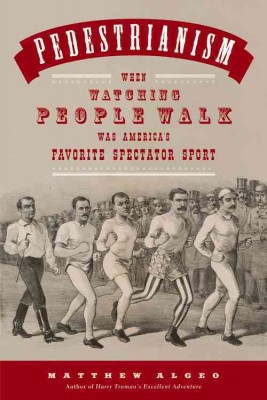| Pedestrianism: When Watching People Walk Was America's Favorite Spectator Sport Contributor(s): Algeo, Matthew (Author) |
|
 |
ISBN: 1613743971 ISBN-13: 9781613743973 Publisher: Chicago Review Press OUR PRICE: $22.46 Product Type: Hardcover - Other Formats Published: April 2014 |
| Additional Information |
| BISAC Categories: - History | United States - 19th Century - Sports & Recreation | History - Sports & Recreation | Walking |
| Dewey: 796.510 |
| LCCN: 2013045115 |
| Physical Information: 0.91" H x 6.23" W x 9.35" (1.22 lbs) 272 pages |
| Themes: - Chronological Period - 19th Century - Chronological Period - 1851-1899 |
| Descriptions, Reviews, Etc. |
| Publisher Description: Strange as it sounds, during the 1870s and 1880s, America's most popular spectator sport wasn't baseball, boxing, or horseracing--it was competitive walking. Inside sold-out arenas, competitors walked around dirt tracks almost nonstop for six straight days (never on Sunday), risking their health and sanity to see who could walk the farthest--500 miles, then 520 miles, and 565 miles These walking matches were as talked about as the weather, the details reported from coast to coast. This long-forgotten sport, known as pedestrianism, spawned America's first celebrity athletes and opened doors for immigrants, African Americans, and women. The top pedestrians earned a fortune in prize money and endorsement deals. But along with the excitement came the inevitable scandals, charges of doping--coca leaves --and insider gambling. It even spawned a riot in 1879 when too many fans showed up at New York's Gilmore's Garden, later renamed Madison Square Garden, and were denied entry to a widely publicized showdown. Pedestrianism: When Watching People Walk Was America's Favorite Spectator Sport chronicles competitive walking's peculiar appeal and popularity, its rapid demise, and its enduring influence, and how pedestrianism marked the beginning of modern spectator sports in the United States. |